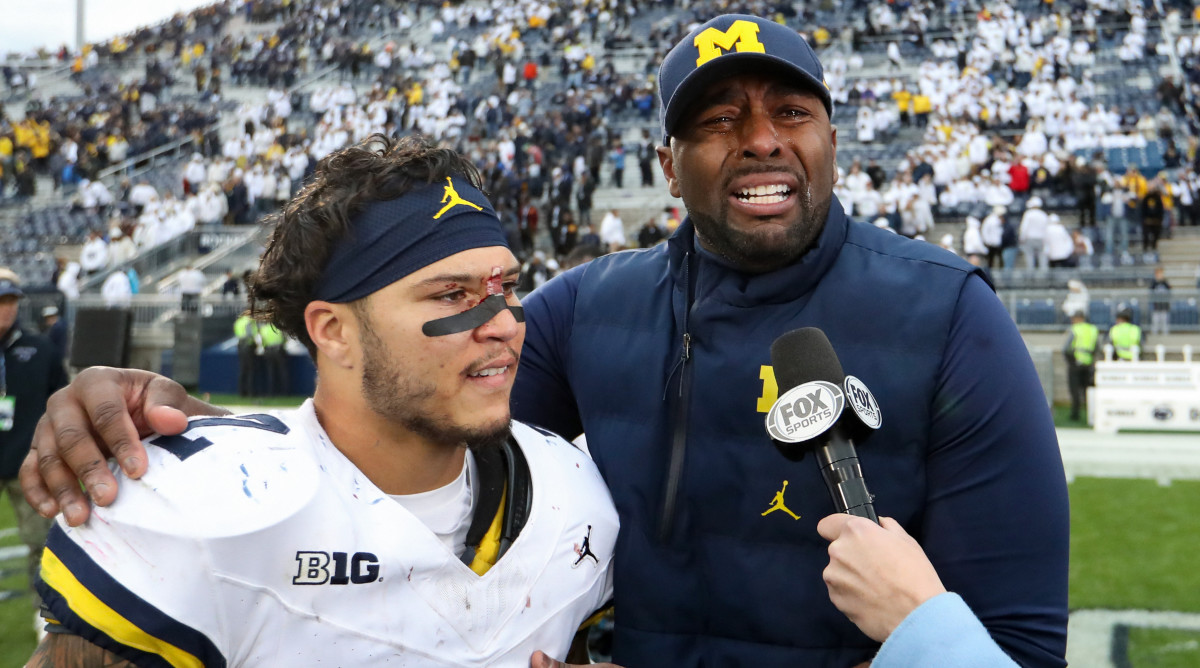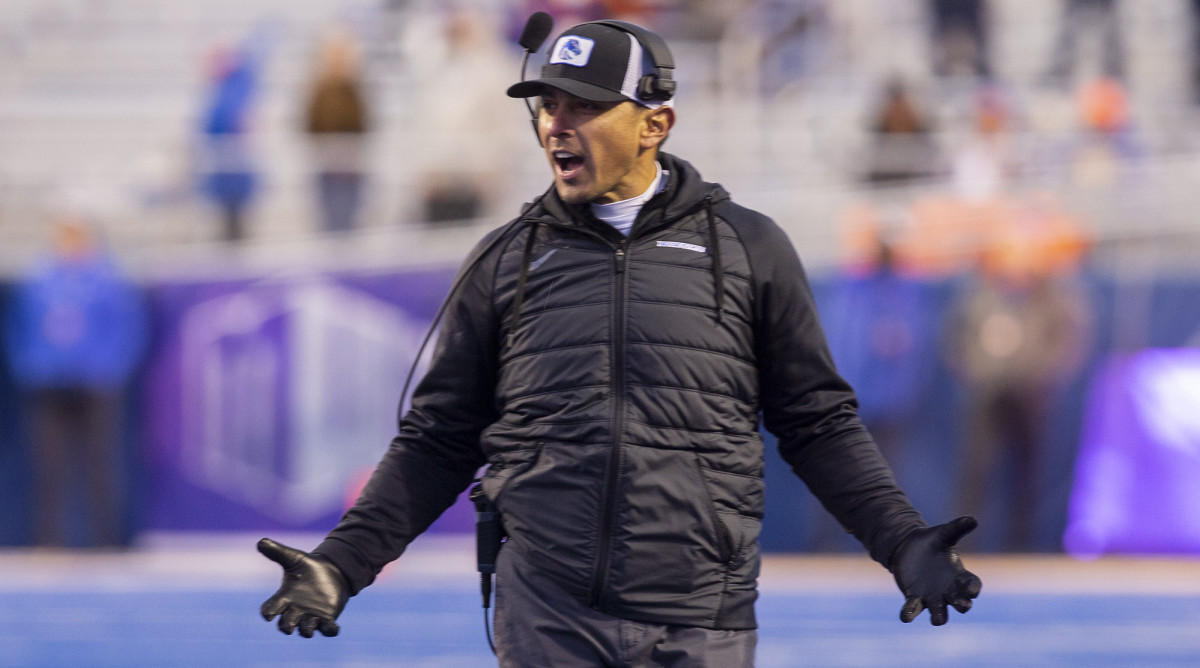Michigan’s Drama Over Jim Harbaugh’s Suspension Reaches Embarrassing New Heights
Forty names, games, teams and minutiae making news in college football, where firing season is off and running:
First Quarter: Texas A&M Conundrum
Second Quarter: Melodramatic Michigan
Regardless what happens hereafter, Michigan has already won one national title: most melodramatic program in America. The Wolverines are setting records for overwrought emotions in response to various suspensions of Jim Harbaugh (11).
Saturday it was interim head coach Sherrone Moore (12) alternately sobbing and swearing on national TV after Michigan blunt-force trauma’d Penn State into submission. Moore’s heaving salute to Harbaugh almost felt like a parody. It gave the impression that the coach was on his death bed, being held hostage or perhaps trapped in an underground mine. In reality, he was suspended (again), and watched the game from the team hotel in State College, Pa.
Last week, Harbaugh was sidelined by the Big Ten for the final three games of the regular season for former staffer Connor Stalions’s alleged espionage ring, which performed impermissible, in-person scouting of Michigan opponents. Harbaugh and Michigan requested a temporary restraining order that would allow him to coach but it will not be heard until Friday. So he sat out the Penn State game, which follows a school-mandated suspension for three games to start the season for another ongoing NCAA investigation.

When the first suspension happened, Michigan responded in florid fashion. Quarterback J.J. McCarthy wore a “Free Harbaugh” shirt before the season opener against East Carolina—perhaps overlooking the fact that this was a school suspension. The Wolverines also took the field for their first offensive play in that game in the “centipede” formation Harbaugh fancied, initially lining up all 11 players in a row behind the center before shifting into something more conventional.
So it would stand to reason that a program which treated that suspension as a life sentence at San Quentin would be even more overwrought this time around, when Harbaugh really might be sidelined for meaningful games. Without question, the institutional outrage has been communicated, with president Santa Ono writing to Big Ten commissioner Tony Petitti before the suspension and athletic director Warde Manuel (13) sounding off afterward.
Manuel’s statement could succinctly be described as a declaration of war against the conference. Will Michigan throw more mud, the way it did last week, when Sports Illustrated and other outlets reported that multiple Big Ten teams sent Michigan’s play signals to Purdue ahead of the Big Ten championship game last year? We’ll see what the week brings.
But amid the gnashing of teeth and rattling of sabres, there was this revelation from SI colleague Michael Rosenberg: Michigan regents discussed leaving the Big Ten if Harbaugh were to be suspended. That would set the bar for institutional overreaction on account of football at a new high.
(Michigan is one of the few schools that could make it work as a football independent, along with Texas and Ohio State. And, of course, Notre Dame, which already is doing it. The question would be what to do with the rest of its sports.)
That sort of Leave the League power play—even if it’s just discussed and never acted upon—underscores the permanent power trip that Michigan and Ohio State have enjoyed for decades within the Big Ten. The league could really use some more balance, both in terms of football success and institutional gravitas. The arrival of four schools from the Pac-12 next year might diffuse things a bit more, but it also may take years—if not decades—for that to take hold.
Which brings us to Penn State (14), which has been in the league for 30 years but still feels a bit like an outsider and has not forced any permanent change in the Big Ten’s gridiron hierarchy. This season presented what seemed like the Nittany Lions’ best opportunity to do so since 2016, but they’ve flagrantly fallen short.
After flopping offensively against both Ohio State and Michigan, head coach James Franklin (15) fired coordinator Mike Yurcich (15) Sunday. It was deserved. The Nittany Lions appeared to have no Plan B against high-powered defenses, and might not even have had much of a Plan A. Already lacking explosiveness in games against weaker competition, Penn State was further exposed as completely incapable of making big plays against the Buckeyes and Wolverines. They had just 49 rushing yards against Ohio State and 74 passing yards against Michigan, both entirely insufficient outputs.
Franklin now will look for his sixth offensive coordinator since becoming the Penn State coach in 2014. Two of the previous five left for promotions to head coach: Ricky Rahne at Old Dominion and Joe Moorhead at Akron. The other three—John Donovan, Kirk Ciarrocca and Yurcich—flat out haven’t been good enough. That circles back to Franklin, who hasn’t yet been able to figure out a way to measure up against Michigan and Ohio State.
Turnover Out West—With More to Come?
USC got the firing party started last week by dismissing defensive coordinator Alex Grinch. This week, Boise State (16) entered the chat by firing third-year head coach Andy Avalos. The established dynamic at Boise had been making home-run hires and then eventually losing those coaches to power conferences, but Avalos was trending the opposite way. The Broncos had lost their primacy in the Mountain West Conference, at a time when the league isn’t as good as it had been.

Avalos was a Boise State linebacker under Dan Hawkins. If the school wants to stay in the family and re-connect to its true halcyon days of high-powered offenses coached by Chris Petersen, there are options.
The most obvious is Kirby Moore (18), the offensive coordinator at Missouri, a former Boise wide receiver who caught passes from his brother, Kellen, the best player in school history and currently the offensive coordinator of the Los Angeles Chargers. There also is Bryan Harsin (19), who succeeded Petersen at Boise and won 78 percent of his games there before making the spectacularly bad decision to take the Auburn job.
Boise should be at the top of the Mountain West every season. The fact that it is not was reason enough to fire Avalos and commence searching for the person who can rebuild the program.
There is a rebuilding job that has stalled out West: Chip Kelly (20) took longer than expected to get UCLA up and running, but his 17–8 record in 2021 and ’22 indicated that the corner had been turned. But this season has been a regression: the Bruins are 6–4, 3–4 in the Pac-12, and have beaten no one of note. They’ve scored a total of 17 points in successive losses to Arizona and Arizona State.
Some of this was inevitable: Kelly built toward a big 2022 season with a veteran team, and some slippage was expected. But Kelly was hired with the expectation of reprising the Pac-12 championships and top-10 teams he produced at Oregon. That hasn’t happened.
Would UCLA make a change? Athletic director Martin Jarmond wasn’t the guy who hired Kelly, and moving to the Big Ten creates a new level of urgency. Keep an eye on the Bruins in their final two games against old rivals California and USC.
